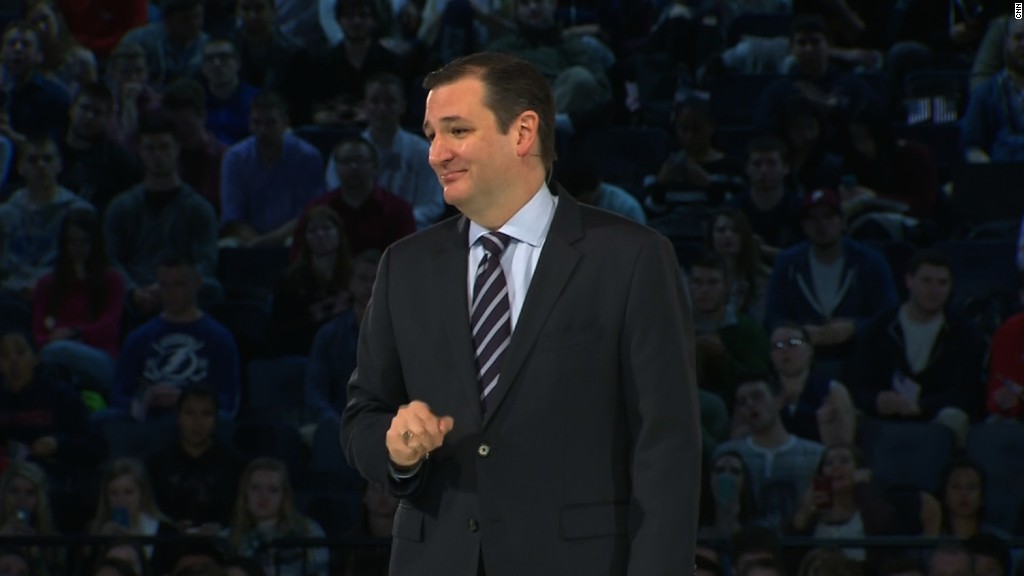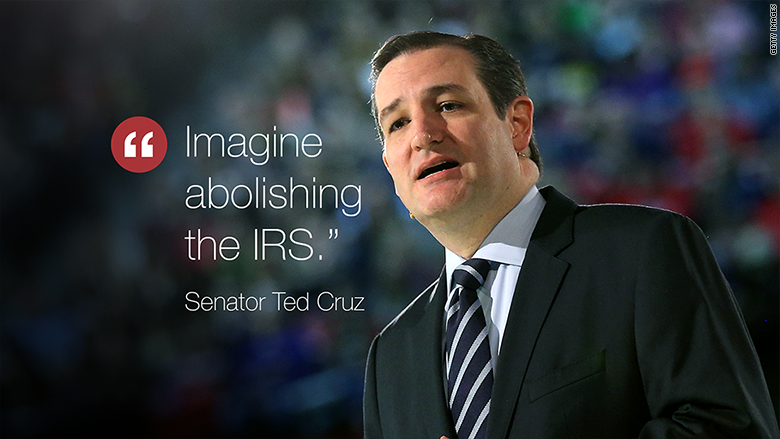
The race for 2016 is officially on.
Senator Ted Cruz is the first to announce his or her presidential candidacy, and he had a lot to say about the election issue expected to take center stage: the U.S. economy.
Here are Cruz's top economic talking points so far...
1. Cruz: We have a 'job problem': Cruz claims the economic recovery has been lackluster, especially for jobs.
"We should have been focusing on jobs and economic growth and opportunity," Cruz told Fox News after President Obama's State of the Union address in January.
BUT: America just had its best year of job growth since 1999. Hiring so far in 2015 has well exceeded expectations. Economic growth last year hit its highest point since 2010.
While Europe stagnates and China slows, many economists say the U.S. economy is the bright spot on the global stage.
Even the unemployment rate is down to 5.5% -- its lowest point since May 2008.
Related: Good news: Unemployment at lowest in 7 years
2. Americans are dropping out of the workforce: "The reason the unemployment rate keeps falling is millions of people keep dropping out of the work force altogether," Cruz told Fox.
Cruz is correct that the percent of Americans in the workforce today is at its lowest point in the past three decades, but he's muddling that statistic with unemployment.
BUT: Baby Boomers are reaching retirement age. There are about 77 million Baby Boomers -- people born between 1946 and 1964 -- in the U.S., according to the Census Bureau. That's almost a quarter of the U.S. population. The percent of Americans at work was going to drop no matter who was president right now and the trend is likely to carry over to the next president.
U.S. unemployment is falling for two major reasons: Baby Boomers are retiring and millions of jobs have been added over the past few years.

3. Implement a flat tax and 'abolish the IRS': Cruz wants a flat tax system -- where all taxpayers pay the same income tax rate. He also wants to get rid of the IRS.
"Imagine a simple flat tax. ... Imagine abolishing the IRS," Cruz said Monday when he announced his candidacy at Liberty University.
Many of his Republican predecessors have called for a flat tax system in past elections without any success. His plans aren't detailed enough yet to really assess what their impact would be on the economy or government revenues.
BUT: While Cruz talks about wanting to help America's most needy, there are concerns that a flat tax could hurt the poor the most. Under the current tax system, many low-income Americans don't pay much, if anything, in federal income taxes. Moving to a flat tax could mean their income taxes would rise.
As for the IRS, it's unclear how Cruz would collect taxes without the agency.
Related: Income inequality hurts economic growth
4. Inequality is rising: "We're facing right now a divided America when it comes to the economy," Cruz told Fox recently.
Cruz hammers home valid points about rising inequality and stagnating wages. By some calculations, inequality is at its worst point since the 1920s. The wealthy have benefited from a six-year rise in the stock market, while the working class has barely seen any increase in household income since 1995.
Wages grew only 2% in February, well below the Federal Reserve's 3.5% goal. As costs rise, that 2% wage growth leaves people barely any better off, if at all.
BUT: Big box employers led by Walmart (WMT) are raising wages while other CEOs say they're competing to retain workers. There's a widely-held expectation that wage growth could pick up in 2015, since wages are usually the last thing to rebound in a recovery.
Of course, even wage growth may not be enough to bridge the inequality gap. That's been expanding for decades and no president has reversed its course.
Related: 3% raises are (likely) back in 2015
5. Build an energy economy: In perhaps his most concrete proposal at this stage, Cruz wants Congress to approve the building of the Keystone XL pipeline and allow more drilling offshore. He says that will offer Americans jobs and improve infrastructure.
"A Republican Congress should immediately help Americans get more jobs by embracing America's energy renaissance," Cruz wrote in the op-ed last year.
BUT: Cruz's main plan to spur the economy and jobs right now is energy centric -- a tough strategy to pursue when energy companies are actually laying off workers. The price of oil has fallen dramatically from over $100 last summer to under $50 today. Energy companies are hurting right now.
That makes it harder to justify the Keystone XL pipeline, since the world currently has too much oil.
Related: What an interest rate increase means for real people
6. Time to 'Audit the Fed': Cruz and other Republicans believe the central bank isn't transparent enough and he wants it to be audited.
"Enough is enough, the Federal Reserve needs to open its books -- Americans deserve a sound and stable dollar," Cruz wrote in an Op-Ed in USA Today late last year.
BUT: The Fed is already audited twice a year. The Republicans' "Audit the Fed" call is viewed by many as an attempt to meddle with monetary policy. It's unclear what a third audit would achieve.
Currencies are known to be unpredictable, but the dollar is having a pretty good ride. It has rallied for the past year against the euro and the world's other major currencies. In fact, it's at its highest level in over a decade and some people now worry dollar is actually too valuable.
It's still early -- Cruz is first out of the gate -- but he has a lot more explaining to do on his economic policies.


